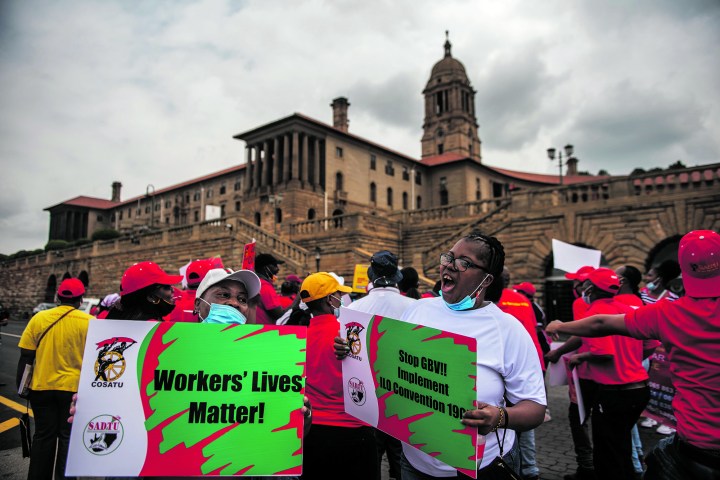DM168 Workers' Day
How the workplace has shifted 27 years into democracy

Almost three decades after South Africa’s first democratic elections, just how much has changed when it comes to fair labour practices, and what challenges do workers still face?
First published in the Daily Maverick 168 weekly newspaper.
Twenty-seven years into democracy, as we mark Workers’ Day on 1 May, there has been a sea change in terms of work practices over the years. Most notably, black South Africans who were previously discriminated against during apartheid now have the right to strike, the right to fair labour practices and the right to join trade unions.
They also have more upward mobility. Writing on senior positions being reserved for white people during apartheid, Padraig O’Malley, an author and academic who’s written on South Africa’s journey to democracy, says on his blog: “The effect of this was to keep black workers in perpetual subordination to anybody who was white and to relegate them to second-class occupational status in the workplace.”
Now, with nonracial worker rights enshrined in democracy, there are still many challenges that South Africans face in a working world that has undergone radical technological shifts. These shifts impact on all working South Africans, whether they are on the shop floor or in managerial and other professional positions.
Among them is the growing trend in an expanding gig economy for big companies to opt to use more casual workers and labour brokers, said Carin Runciman, an associate professor at the University of Johannesburg who studies precarious work and labour movements.
“What we’re also increasingly seeing, which is a new trend for South Africa, is the use of zero-hour contracts, where workers have a permanent contract but no guarantee as to how many hours they may work in a week or a month,” said Runciman.
In 2020, workers from the multinational chocolate company Ferrero took the company to the Commission for Conciliation, Mediation and Arbitration (CCMA) over their zero-hour contracts. A total of 257 employees out of 354 are employed on these contracts. Writing for New Frame on the case, Dennis Webster wrote: “The CCMA held that the zero-hour contracts – whose highly erratic nature had thrown the lives of Ferrero’s casual staff, the majority of whom are women, into disarray – constituted an ‘unfair labour practice’ and were structured in such a way that they undermined the rights guaranteed to workers by the Constitution.”
In terms of gender, women are often casual workers. This is because of the kind of sectors women often work in, such as domestic work, retail and cleaning, said Runciman.
With technological advancements affecting every industry, the way that work is done is drastically changing. But Runciman, whose research mainly looks at workers in manufacturing, said that technology wasn’t being used to make the work easier, but rather to surveil workers. “For example, there’s the biometric clocking, which requires workers to clock in and out. In some instances I’ve heard of workers being allocated specific times to use the toilet,” said Runciman.
While workers can express their concerns with their employers, research done by Trades Union Congress in the UK found that workers on zero-hour contracts were reluctant to voice their grievances with their employers because they feared they’d be given fewer shifts as punishment.
The low wages and exploitative working conditions are why trade unions would step in to fight for the workers’ rights. Speaking on the role of trade unions, Bianca Chigbu, a postdoctoral fellow at the University of Fort Hare, with research interests in labour relations, said it “is to ensure good working conditions for workers and that workers have a sense of job security”.
But now, “trade unions look very different”, said Runciman. You’d think that blue-collar workers would be the people at the centre of trade unions, but what you find is that most of the people in the trade unions are supervisors, said Runciman.
According to a blog post by the Casual Workers Advice Office (CWAO), a Congress of South African Trade Unions (Cosatu) survey revealed that 92% of the federation’s membership is made up of permanent workers and that more than 60% are white-collar workers. “The federation is moving in an opposite direction from its blue-collar roots,” writes the CWAO.
As it stands, “[the] trade unions’ power is derived less from organised workers. It’s more about political relations with the ruling party,” said Runciman.
In an op-ed published in Daily Maverick, Zwelinzima Vavi, former general secretary of Cosatu and now the South African Federation of Trade Unions’ general secretary, criticised trade unions for not challenging the “status quo” that exploits black workers. Vavi wrote: “…because Cosatu and its unions benefited from the status quo they have a reason to keep the status quo intact for selfish and narrow reasons largely reflecting the self-interest of leaders. These reasons include the former comrades’ ability to now afford to move their children to better schools in the former whites-only schools.” DM168
This story first appeared in our weekly Daily Maverick 168 newspaper which is available for free to Pick n Pay Smart Shoppers at these Pick n Pay stores.

















 Become an Insider
Become an Insider
Comments - Please login in order to comment.